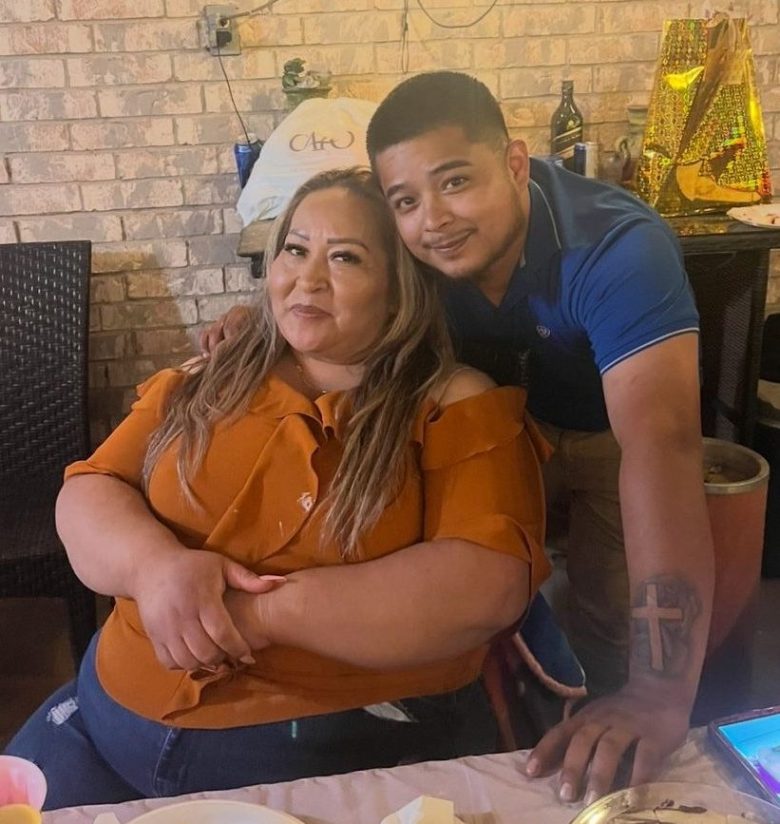
The release of two El Paso County DACA recipients detained by Immigrations and Customs Enforcement – ordered by two different federal judges – should send a message to President Donald Trump’s administration that it can’t arbitrarily detain individuals protected from deportation by law under the policy, a group of attorneys and community organizers said Thursday.
“We hope the administration will cease unlawfully arresting individuals without due process of law and that these victories send a message that there is a large legal community who will fight back when that occurs,” said Marisa Ong, senior counsel at the law firm Singleton Schreiber based in San Diego, during a virtual news conference Thursday morning.
Ong was among a group of attorneys and organizations who represented Catalina “Xóchitl” Santiago after she was arrested Aug. 3 at El Paso International Airport and held in ICE detention for two months before being released Wednesday on orders of a federal judge.

Santiago of El Paso and Paulo Cesar Gamez Lira of Horizon City, both 28, are recipients of Deferred Action for Childhood Arrivals, a policy implemented in 2012 under former President Barack Obama that offers temporary protection from deportation for individuals who were brought to the United States as children.
U.S. District Judge Kathleen Cardone of El Paso granted Santiago’s petition for release from the ICE El Paso Service Processing Center on Montana Avenue on Wednesday, while U.S. District Judge William P. Johnson of Albuquerque granted Gamez’s release from the Otero County Detention Center in New Mexico on Sept. 24. Both judges stated that the government offered no reason for their detention and that keeping them detained violated their rights to due process.
“This is obviously a huge victory for Xóchitl … but it also sends a strong message to the government about its arbitrary and cruel arrests of DACA recipients across the country and so many other noncitizens who have built their lives here with the government’s permission,” said Ellie Norton of the National Immigration Project, who worked on Santiago’s case.
Norton said the decision comes amid “unprecedented efforts” by the Trump administration to arrest noncitizens and subject them to mandatory detention. “We hope that this decision makes a difference and we will continue to stand up to the unjust and inhumane actions of this administration.”
The Department of Homeland Security didn’t immediately respond to El Paso Matters questions about comments made during Thursday’s news conference.
Santiago has lived in the United States since she was 8 years old. She obtained DACA protection when it first became available in 2012, and has been renewed every two years, the last time through April 2026. A community organizer, she has worked with various nonprofits, including La Mujer Obrera.
Gamez, a forklift operator and father of four, was arrested Aug. 13 outside his Horizon City home. He obtained DACA in 2014 and has been granted renewals since, most recently through August 2026.
Milo Arevalo, who was a key player in the creation of the “Free Xóchitl Network” of grass roots activists and supporters who petitioned for her release, said it’s important to recognize the win in the courts but also as a “community victory.”
“Today, we are rejoicing in knowing Xóchitl is home, is with her loved ones, but we will not be forgetting the injustice of ICE’s actions that ripped her away from her loved ones in the first place,” Arevalo said, calling her arrest “racial profiling.”

For Santiago’s family, the detention is more personal.
“There is no linear path to a place where we’ll be fully healed,” Santiago’s brother, Jose, 29, who asked that his full name not be used, said during the news conference. “It’s been a hard two months – two months of not being able to talk, to see my sister.”
Jose said Santiago first called their mother when she was released, telling her something along the lines of “ya estoy afuera, no se preocupen,” or, “I’m free now, don’t worry.”
“There wasn’t a lot of words,” he said, “just lots of emotion and more than anything, happiness.”
Still, Jose noted that the conditions of Santiago’s detainment had the family worried, saying “we’ve been treated less than inhumanely.”
Jose said his sister’s detention prompted protests across Texas, Florida, New Jersey and Michigan where her work has had an impact, adding that everyone is eager to hear from Santiago. He said Santiago needs some time to reconnect with family before speaking about her experience to the public and the press.
“But knowing her, she will,” he said.
Santiago and Gamez are among 20 DACA recipients nationwide being held in ICE detention, according to the immigrant rights group Home is Here, which said it is tracking media and community reports on the cases.
Nearly 538,000 active DACA recipients were reported in the country as of September 2024 – nearly 90,000 of them in Texas, according to U.S. Citizenship and Immigration Services reports.
DACA recipients represent about 100 different birth countries, with about 80% of them born in Mexico, according to the nonpartisan advocacy organization National Immigration Forum. The states with the largest DACA populations include California and Texas, as well as Illinois, New York and Florida, the organization’s 2024 fact sheet states. The average DACA recipient arrived in the United States at age 7 and has lived in the United States for more than 20 years.
Luis Cortes Romero, an attorney with the Novo Legal that represented Santiago in her deportation case, said DACA recipients are the latest target in Trump’s mass deportation efforts.
“It’s a scare tactic,” he said. “People are scared to be detained. The government can say what it wants, but the law is very clear.”
Who’s eligible for DACA?
To qualify for DACA, applicants must show they came to the U.S. before age 16, were younger than 31 on June 15, 2012, and have lived here continuously since June 15, 2007. They must also be enrolled in school, have graduated from high school or earned a GED.
Background checks are required, and applicants cannot have a felony or significant misdemeanor conviction or otherwise pose a threat to public safety.
To renew, recipients must prove they’ve remained in the U.S. since their last approved application and not traveled abroad without advance parole since Aug. 12, 2012. They’re subject to the same rules on criminal backgrounds as when they first applied. Renewals require an application fee of up to $605 and must be filed every two years.
Path to citizenship for DACA recipients
Since DACA’s implementation, its legality has been challenged in court numerous times – including during the Obama administration when it sought to expand the program and in 2017 during Trump’s first term when the administration sought to rescind it.
“We know DACA is and always has been lawful. That is why every attempt to try to end DACA through the courts over the last 13 years has failed,” said Juliana Macedo do Nascimento, deputy director of federal advocacy with United We Dream, an advocacy group for immigrant youth.
While DACA renewal applications are still being accepted and processed, Macedo do Nascimento said, no new applications are being accepted.
Several bills introduced by Congress this year seek to provide a path to citizenship for DACA recipients – including the Dignity Act of 2025 introduced in July by U.S. Rep. Veronica Escobar, D-El Paso, and Republican Rep. Maria Elvira Salazar of Florida.
The bill, a revised version of the bill they introduced in 2023, creates a conditional permanent resident status for Dreamers brought into the United States at 18 or younger and have lived in the country continuously since 2021. To qualify, applicants would also be required to undergo a criminal background check, meet certain education criteria and pay an application fee of up to $1,140. To become a permanent resident, applicants would have to obtain a college degree, serve in the military or work for four years, among other qualifications.
Dreamers refer to undocumented individuals who were brought into the United States as children. DACA recipients are those Dreamers who applied and qualified for protection from deportation. In essence, all DACA recipients are Dreamers but not all Dreamers are DACA recipients.
The post ‘A huge victory’: ICE can’t ignore DACA protections, legal advocates say after El Paso area federal court rulings appeared first on El Paso Matters.
 Read: Read More
Read: Read More




